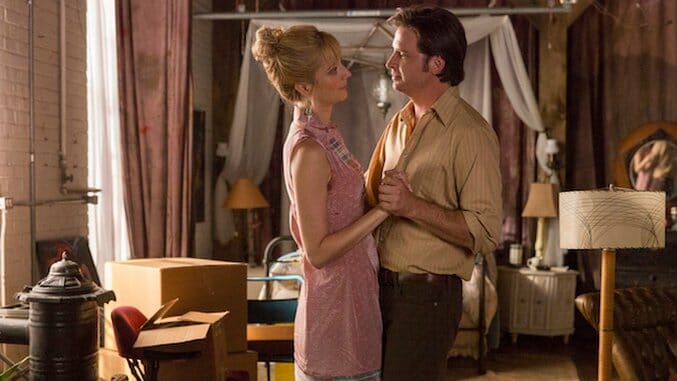Stillness in the Noise: A Farewell to SundanceTV’s Truly Essential Rectify
Jackson Lee Davis/Sundance
Midway through the third season of SundanceTV’s Rectify, Daniel Holden (Aden Young) gets his first job since being released from prison. At the beginning of the series, his conviction in the rape and murder of his high school girlfriend, Hanna Dean, is vacated after the introduction of new DNA evidence, and yet this is not the equivalent of an acquittal; some gaps in what happened that night still need to be filled in.
Season Three sees Daniel sacrifice himself for his family, admitting to charges that bar him from ever coming back to Paulie, Georgia, the only town he’s ever called home. Before he leaves, though—before he joins the New Canaan Project, a group that looks to help ex-convicts find a foothold in a world unfamiliar to them, his old pal Melvin (John Boyd West) gives him a job painting the pool at the apartment complex he manages. Daniel finds solace and even gratification in the work, a sense of normalcy and order in a world that’s set him adrift. Still, the demons lurk. He sabotages the job in a moment of frustration—understandable frustration, considering the circumstance—before coming back the next day and making everything right. He paints the pool, and then shares a beer with Melvin and his sister, Amantha (Abigail Spencer), a moment of assuredness before being sent off into the unknown. Rectify may not have always had the most subtle metaphors—painting the pool comes after the failed remodeling of a kitchen, as reclamation projects abound—but they did serve to underscore a more subtle story. Digging into those details reveals what makes Rectify unique, and why it will be sorely missed.
There’s little doubt that when you examine how we consume TV in today’s environment, there’s a focus on immediacy, at least among those avid fans and critics that populate our Twitter timelines with live-tweets and a constant churn of essays musing on whatever new show has captured our attention. Everything feels urgent: It’s inherent in Netflix’s marketing model, which hypes up a release date—say, for Gilmore Girls: A Year in the Life—to creating a sense of needing to be “in the know” by said date, only for that show’s hype to disappear until, if they’re lucky, the end-of-year listicle rush begins. More than ever, viewers are being pulled in two different directions. On the one hand, there’s the pressure of keeping up with the cultural zeitgeist and the accompanying FOMO (fear of missing out, for the uninitiated), and on the other hand there’s simply too much out there for a single person to keep up with.
In that environment of immediate consumption, of a continuous cycle of feverish hype followed by deadly silence, Rectify was an anomaly, a meditation room tucked away in a busy airport. The series’ elevator pitch—What really happened the night Hanna Dean was raped and murdered?—seems ripe for the procedural crime drama. But Rectify was never all that interested in getting to the bottom of the case that sent its main character to prison. Instead, the show treated its inciting incident as a catalyst for more introspective storytelling, using the murkiness of that night to expound upon the unpredictability of the human condition. So, while the question of who killed Hanna Dean is certainly important to Daniel and his aching family, it’s hardly important to the show’s larger purpose. Rectify is the very definition of a show where the journey is its own reward.
Even if Rectify never really fit into the TV consumption model of our times, by the end of its run its thematic material and character insights felt more relevant than ever. Let’s face it: The political and cultural dialogue in 2016 was nasty and divisive, and the final climax, the election of Donald Trump as President of the United States, immeasurably changed the way many people view the world. Art doesn’t operate in a vacuum, making it nearly impossible to consume TV shows, movies and albums without tying them back to some larger cultural and political context. Be it a small and whiny uprising against Rogue One: A Star Wars Story for being too politically charged, or evaluating American Crime Story: The People v. O.J. Simpson in the context of increasing evidence of racially motivated police shootings and a justice system failing to dole out significant punishment, any art with a political bent finds itself brimming with perhaps unexpected relevance.
-

-

-

-

-

-

-

-

-

-

-

-

-

-

-

-

-

-

-

-

-

-

-

-

-

-

-

-

-

-

-

-

-

-

-

-

-

-

-

-








































